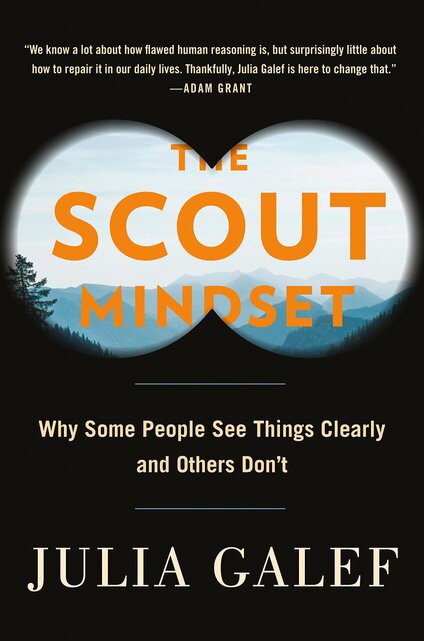In The Scout Mindset: Why Some People See Things Clearly, and Others Don’t, author Julia Galef describes two approaches to thinking: the soldier and scout mindsets. Julia argues that what makes scouts better at getting things right isn’t that they’re smarter or more knowledgeable than everyone else. It’s a handful of emotional skills, habits, and ways of looking at the world—that anyone can learn.
Scout Mindset
The motivation to see things as they are, not as you wish they were.
Scout mindset is what allows you to recognize when you are wrong, to seek out your blind spots, to test your assumptions and change course. It’s what prompts you to honestly ask yourself questions like “Was I at fault in that argument?” or “Is this risk worth it?” or “How would I react if someone from the other political party did the same thing?
“The first principle is that you must not fool yourself—and you are the easiest person to fool.” – physicist Richard Feynman
Scout mindset is what keeps you from fooling yourself on tough questions that people tend to rationalize about, such as: Do I need to get tested for that medical condition? Is it time to cut my losses or would that be giving up too early? Is this relationship ever going to get better? How likely is it that my partner will change their mind about wanting children?
Scout mindset is what prompts us to question our assumptions and stress-test our plans. Whether you’re proposing a new product feature or a military maneuver, asking yourself, “What are the most likely ways this could fail?” allows you to strengthen your plan against those possibilities in advance. If you’re a doctor, that means considering alternate diagnoses before settling on your initial guess.
directionally motivated reasoning
When we want something to be true, he said, we ask ourselves, “Can I believe this?,” searching for an excuse to accept it. When we don’t want something to be true, we instead ask ourselves, “Must I believe this?,” searching for an excuse to reject it.
Scout vs Soldier Mindset
Soldier Mindset
- Reasoning is like defensive combat.
- Decide what to believe by asking either “Can I believe this?” or “Must I believe this?” depending on your motives.”
- Finding out you’re wrong means suffering a defeat.
- Seek out evidence to fortify and defend your beliefs.
- Related concepts: Directionally motivated reasoning, rationalizing, denial, self-deception, wishful thinking.
Scout Mindset
- Reasoning is like mapmaking.
- Decide what to believe by asking, “Is this true?”
- Finding out you’re wrong means revising your map.
- Seek out evidence that will make your map more accurate.
- Related concepts: Accuracy motivated reasoning, truth-seeking, discovery, objectivity, intellectual honesty.
Soldier Mindset
Our thinking is guided by the question “Can I believe it?” about things we want to accept, and “Must I believe it?” about things we want to reject. We use soldier mindset to help us maintain beliefs that boost our self-esteem, give us comfort, preserve our morale, persuade other people, cultivate an attractive image, and help us fit in to our social groups.
Scout Mindset
In scout mindset, our thinking is guided by the question “Is it true?” We use it to help us see things clearly for the sake of our judgment, so that we can fix problems, notice opportunities, figure out which risks are worth taking, decide how we want to spend our lives, and, sometimes, better understand the world we live in for the sake of sheer curiosity.
Present Bias
A feature of our intuitive decision-making in which we care too much about short-term consequences and too little about long-term consequences. In other words, we’re impatient, and we get more impatient as the potential rewards grow closer.
“Hope is a good breakfast, but a bad supper.” – Francis Bacon
BEING SMART AND KNOWLEDGEABLE DOESN’T MAKE YOU A SCOUT
Intelligence and knowledge are just tools. You can use those tools to help you see the world clearly, if that’s what you’re motivated to do. Or you can use them to defend a particular viewpoint, if you’re motivated to do that instead. But there’s nothing inherent to the tools that makes you a scout.
All the best in your quest to get better. Don’t Settle: live with Passion.

Comments are closed.